Tsara Shelton's Blog, page 16
December 6, 2017
Autism Answer: Alibi (Video/Song)
I wrote another song. Weird, right? I mean, I'm not a songwriter. But I am a writer so I suppose songs happening isn't that unbelievable. :D
This one was inspired by the #MeToo movement. Quite different from my last song (Sexy Daydreams, My Life Is Awesome) which was inspired by me loving and celebrating every little thing about my life. Yet also quite the same since it was inspired by my life.
Anyway, here is a video of me singing it.
And here are the lyrics:
Alibi
written by Tsara Shelton
I was sleeping
when he came in
he was touching
I was frightened
Why do I cry
when it's not my
crime, I am my own
alibi
I was drinking
he was driving
lying, trying
to keep me quiet
Why do I cry
when it's not my
crime, I am my own
alibi
He was kindly
saying "no, please"
I was pushing
hardly listening
Why do I cry
when it is my
crime, I am my own
alibi
They were growing
I am teaching
wanting, needing
to do this right
Why do I cry
when it is my
crime, I am my own
alibi
Why do I cry
while I do try
to stop this crime
I'm my alibi
My own
alibi
# # #
Hugs, smiles, and love!!
Autism Answers with Tsara Shelton (Facebook)
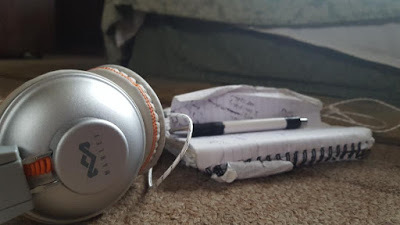
This one was inspired by the #MeToo movement. Quite different from my last song (Sexy Daydreams, My Life Is Awesome) which was inspired by me loving and celebrating every little thing about my life. Yet also quite the same since it was inspired by my life.
Anyway, here is a video of me singing it.
And here are the lyrics:
Alibi
written by Tsara Shelton
I was sleeping
when he came in
he was touching
I was frightened
Why do I cry
when it's not my
crime, I am my own
alibi
I was drinking
he was driving
lying, trying
to keep me quiet
Why do I cry
when it's not my
crime, I am my own
alibi
He was kindly
saying "no, please"
I was pushing
hardly listening
Why do I cry
when it is my
crime, I am my own
alibi
They were growing
I am teaching
wanting, needing
to do this right
Why do I cry
when it is my
crime, I am my own
alibi
Why do I cry
while I do try
to stop this crime
I'm my alibi
My own
alibi
# # #
Hugs, smiles, and love!!
Autism Answers with Tsara Shelton (Facebook)

Published on December 06, 2017 07:22
November 29, 2017
Autism Answer: Being Supportive Of Our Brothers - But Not Blindly
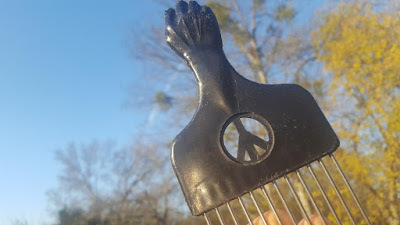 Peace and Power
Peace and PowerTimely Note: There is a movement happening right now. We are perched precariously in a place where women, girls, boys, men, people are speaking up about abuse and are beginning to be believed. We are wobbling on nervous legs here, hoping to do the right thing and make a safe, correct shift that doesn't demonize or frighten folks to the point of imploding an important and necessary change. I, too, am hopeful and anxious and reliving past pains with present understanding. Many people we love and admire are playing various roles in this story and we are being asked - being required - in real time to figure out the safest way to handle this. For ourselves and, even more so, for future generations. I am sharing the following conversation I had with a local girl as an example of how I am trying to be candid, honest, clear, and kind. It is my habit, in the interest of being liked and avoiding confrontations, to easily agree with people or simply smile and nod understanding of someone else's opinions when I don't agree. But over the last few years I have been actively practicing sharing my opinions in the moment, with thoughtfulness, even if they clash with the person I am speaking to. I hope that my caring came through as I spoke up for all the victims in the following story. ~Tsara
_______________________________
A condensed version of the conversation I had last night with a young girl in our small town:
I stepped outside of our local grocery store and she was sitting alone on a swinging chair that is for sale. She is often sitting there, asking for things from passers-by. She and many of her other family members are known to do so.
HER: So, I guess you know where my kid-brother is.
ME: I think so? I heard he was in jail.
HER: Yes. Do you know what he's accused of?
ME: I'm not sure.
HER: Well, I'll tell you. Wait till these kids walk past.
She hesitated; the kids frowned at her uncleanliness and strong scent as they walked past; I acknowledged the moment as important before being certain why.
HER (Con't): Well, he's in jail for rape of a family member. Can you believe that? Now, you've known me and my brother for years and years, does that sound like something he'd do?
She looked at me expectantly.
ME: Oh, I can't say I know. I've experienced and known people to experience rape and assault enough to know that it isn't possible to guess who would or wouldn't. But I am sorry for you and your family. This must be a rough time.
HER: Ya, okay, I see your point. But you've known us long and is that something you can believe he would do?
ME: Like I said, I don't know. I hope not. There was absolutely no way I would have believed my step-dad could molest me, yet he did. He was the one who would never do that, we were sure. We just KNEW he would protect us from such things and were only afraid he may overreact if someone else did do something of the sort. Yet, he molested me. My mom had to leave him.
HER: Okay, fair point. That sort of thing has happened to me, too. But the girl who's accusing him, okay? Just days before she said this happened she had been running around having sex with a few guys. How can she then call anything rape?
ME: Oh, I've done that, too. You can be promiscuous but still get raped. In fact, it often happens. Sometimes people will think that you aren't the kind of girl or guy who says no, and when you do they get pushy or full-on dangerous. It does happen. I'm not saying that your brother did rape this girl, by the way, I'm just being honest that I can't pretend I don't believe it. My feeling is I don't know.
HER: Oh, well, you probably even know this girl. You'll see what I mean when I tell you who it is.
ME: I probably don't know her, actually.
HER: Oh, ya, that's right. You always stay out of everyone's business. That's good. That's a good idea.
ME: Look, hun. I'm not trying to be mean. I honestly feel for you and your family. I honestly care and hope that things turn out for the best in this situation and that everyone discovers some sort of important lesson. I do. I promised to keep you in my thoughts.
HER: (quietly) I just keep thinking that we are going to look so stupid if he really did do it, you know? All of us who are fighting for him and believing him. My mom wants to kick the b*tch's ass, but what if he did do it?
ME: Listen. You can love, support, and help your brother whether he did or he didn't do it. If he did do it, he will need support and love just as much if not more. He will need strong people insisting he NEVER do such things again. Strong women SHOWING him how to treat a lady with respect. People willing to say what needs to be said and risk hurting his feelings while coming from a place of believing he can make changes, he can be better. And if he didn't do it there is likely a reason she said he did. There is likely a lesson still to be discovered and acted upon. Does that make sense?
HER: Yes, I see. Yes. Well, you make good points.
ME: Well, I don't know if they are good or not but they mean a lot to me. They have helped me. Seriously, I'm sorry about the situation. Truly, I'll keep you in my thoughts and send love and hope your way.
HER: Thank you. Thank you. Hey, tell Tyran* that when he's a famous actor I want to walk the red carpet!
ME: (Hugging her) I'll let him know! We tell him all the time that you say so. Have a nice night!
I climbed into my car and hoped I had not been too cruel but also felt proud of myself for being honest and clear.
Hugs, smiles, and love!!
Autism Answers with Tsara Shelton (Facebook)
*Tyran is my second oldest son and his ex-girlfriend is a cousin of the girl I was talking with.
________________________________
Autism Answer: You know, there are a few reasons why I think I was able to be clear and kind and honest when talking about this uncomfortable subject with this girl. One of those reasons is simply, as I said in my introduction, that I've been practicing. But in all honesty the two main reasons I was able to speak up in this way are:
1) I am much older than this girl. Because of that she automatically talks to me and listens differently while I inherently do the same. Had it been her mother talking to me I'm not as certain that I would have spoken up. I have been practicing so I may have. But I also may have reverted to my uncomfortable habit of keeping quiet while simply nodding understanding. I am quite good at not pretending I agree with people that I don't agree with, but I'm less good at making my disagreement clear because I am busy being sure they see I understand their point of view.
2) However, the biggest reason I was able to have the conversation this way with this girl is autism. Growing up in a home filled with autism - where one of the biggest challenges is social understanding - has meant growing up in a home that speaks clearly about every single type of social interaction. We could not shy away from sex or sex talk as my brothers grew older because they were, as most living creatures are, interested and intrigued and curious about sex. So we often talked openly about what is and what is not okay, not in broad terms but with very specific language. Even, sometimes, role-playing social situations so that we all could practice and clearly understand possibilities, reactions, and choices. It was not only enlightening for my brothers but, man, did I ever learn a lot about behavior! It encouraged empathy. It encouraged honest introspection. It encouraged combining strength and kindness as a rule.
While speaking with the girl I felt empathy for her, I thought about my own mistakes and allowed her the same leeway, and I insisted on strength from myself and for her as a kindness. And the conversation was not entirely uncomfortable because, for me, it was familiar. The specifics were different but the message was the same. Social situations are filled with invisible baggage and warring wants and personalities that mingle with often unpredictable effect. Sometimes someone we love or admire does something we can not allow. Sometimes we ourselves do something we can not allow. We must be willing to see and change these things without needing to demonize or hate. It isn't easy, darn it. But it needs to be done.
# # #
Published on November 29, 2017 07:51
November 24, 2017
Autism Answer: My Boys And Their Beautiful Autism
Author's Note: I've pulled this one from the archives. Originally published in 2011 on OpEdNews.com as a diary entry I thought it would be fun to revisit. My brother and I flipping through pages of old photo albums and reminiscing over the Thanksgiving holiday. I felt it would be fun to invite you into some of those memories. (CONFESSION: Okay, the truth is I wanted an excuse to post this picture I found that is one of my absolute favorite photos of my two youngest sons. I searched my blog for this piece I had known I'd written - the one you are about to read - so that I could add the picture, but apparently, I had only published this piece on OpEdNews. So, I had the fun excuse of publishing both the picture and the story!) I hope you enjoy my memory. I KNOW you'll enjoy the photo! Happy holiday season!! ~Tsara
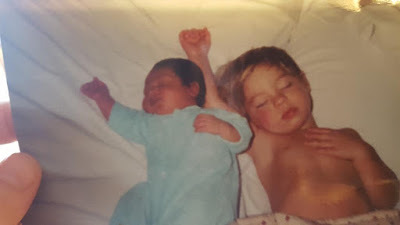 Declyn & Shay, my youngest sons.
Declyn & Shay, my youngest sons.
My Boys And Their Beautiful Autism (written in 2011) Having four boys is a wonderfully large amount of work and worry. It is the greatest way to force yourself into a world of self-motivation, observation, and priority changing. I love the challenges and changes that have become a part of my life as a result and especially appreciate the guidance I have been given along the way. Sharing the stories, learnings, and laughter is another great way to solidify my own ideas and maybe even help other moms who might feel a little stuck. So for this website, I would love remember the beginning of my journey with my two youngest sons.
Shay is my second youngest. From the moment he came into the world we knew there was something different about him. The usual "It's a boy!" was replaced with my mom's unsure "It's a ...baby!" (My mom delivered three of my four sons.) He was not deformed, my mom's uncertainty did not come from any actual physical confusion on the baby's part but my mom's extremely reliable intuition. She felt the difference in my newest son and prepared me from the start. And we lovlingly laughed from the start!
He turned out to be the perfect baby. Where my older two were rambunctious and stubborn, insisting always that mommy do everything, never accepting help from other adults, Shay was quiet and happy to accept love and snuggles from the nearest loving arms. As he grew he remained comfortable with all of the adults in his life. He would even spend the night with my sister and never miss me. I started to wonder if there was something wrong with me and my relationship with him. How was it that he could just accept aunt or grandma and not need me? My other boys would never have accepted anyone else in so many of the situations where Shay seemed content. My heart worried for months before I voiced my concern. Of course, by then the concerns had piled up. Shay was often dealing with asthma , played alone for long periods of time with small dinosaurs and train parts (esp. Thomas the Train), loved the sensory delight of tapping sticky things on the end of his fingers, and by the age of four was still not talking.
I did the usual, took him to doctors. They said to wait and see, some kids are late bloomers. In the meantime my mom (who had adopted four autistic boys and guided all but one into independence) decided to use this opportunity to learn sign language. What an amazing family I have! Both my mom and sister took a course while I got over my made up fear that Shay and I needed to work on our relationship, by working on our relationship. I realized that with him not needing me the way his brothers had I actually started pulling away, feeling rejected. I quickly stopped that.
By the time he was four we were signing words with our hands in front of our mouths, making language fun and were soon listening to Shay voice his wants. I don't think it took more than a month. Not to mention I had learned the important lesson of allowing Shay to be different than his brothers in the way he loved me and that gave us a different but equally special bond. As I write this he is eleven years old and at school with other eleven-year-olds. His daydreaming drives his teachers crazy and there have been times I could have had him labeled as ADD or Autistic if I thought it would benefit him, he toe-walks that line and, admittedly, I have wondered off and on about the benefits of a label for him. Over and over I have decided against it. My mom does neurofeedback with him when he is struggling to focus and that always gives him the reminder that there is a tool out there for when he feels overwhelmed. He has had a girlfriend for three years and they have made plans for their future that he is quite sure he can make happen. When it comes to his dream of being a stay at home dad with his own restaurant Shay never loses focus.
In so many ways Shay's differences have enriched my life and given me tools for parenting my other children. But nothing compares with what it has done for my youngest son , Declyn.
Declyn was born in 2000 and for some reason was vaccinated strait out of the womb. I didn't remember this happening with any of my other children but it didn't really concern me since I am one of those fools who tends to figure that the professionals know what they are doing. My mom is not. She paid close attention and although I could hardly miss the fact that my newest baby never slept, cried any time I put him down and would go to no other grown up comfortably, I wasn't the first to notice his complete lack of eye contact . My mom pointed it out when Declyn was only about five months old. No matter what position we held him in he would focus somewhere just beyond our smiling eyes. So we found more positions and more exciting ways to grab his attention and encourage him into forgetting that he was uncomfortable with eye contact. Before long he was more than happy to look into our eyes and enjoy the fun reactions this got him! Our arms were exhausted and our eyes and cheeks tired from all the smiling but we ended up with stronger arms, a child who gained the skill and benefits of eye contact and an addiction to smiling. Not to shabby!
Declyn's lack of eye contact was not the only sign that he may have gone down the autism path, he also had (and still has) a tendency towards vomiting (he can't eat outside or look at ugly things while around food), it was years before he became remotely comfortable in social situations and he is still quite uncomfortable meeting new people. But at nine years old he is in fourth grade, brings home great report cards and is Mr. Popularity. Every morning he begs to stay home, even cries sometimes or on rare occasions will throw up, so the transition from home to social situations is still big for him but he handles it and sometimes my heart can't take asking it of him so I let him stay home. Just sometimes.
My two youngest sons are still colored with autism. It is a beautiful part of their personalities and a gift that has been a catalyst for learning and laughing in our family.
A gift that we are going to continue to unwrap together.
_______________________________
UPDATE: Wow, that was fun to read again! And how neat to see the "them" they still are, now at ages nineteen and seventeen, while also knowing how far they've come! How well they've chosen to embrace and harness and understand and value their differences and challenges. Man, I am one lucky, impressed, grateful, happy mom! Thank you for joining me on this trip down memory lane. ~Tsara
 Declyn & Shay, my youngest sons.
Declyn & Shay, my youngest sons.My Boys And Their Beautiful Autism (written in 2011) Having four boys is a wonderfully large amount of work and worry. It is the greatest way to force yourself into a world of self-motivation, observation, and priority changing. I love the challenges and changes that have become a part of my life as a result and especially appreciate the guidance I have been given along the way. Sharing the stories, learnings, and laughter is another great way to solidify my own ideas and maybe even help other moms who might feel a little stuck. So for this website, I would love remember the beginning of my journey with my two youngest sons.
Shay is my second youngest. From the moment he came into the world we knew there was something different about him. The usual "It's a boy!" was replaced with my mom's unsure "It's a ...baby!" (My mom delivered three of my four sons.) He was not deformed, my mom's uncertainty did not come from any actual physical confusion on the baby's part but my mom's extremely reliable intuition. She felt the difference in my newest son and prepared me from the start. And we lovlingly laughed from the start!
He turned out to be the perfect baby. Where my older two were rambunctious and stubborn, insisting always that mommy do everything, never accepting help from other adults, Shay was quiet and happy to accept love and snuggles from the nearest loving arms. As he grew he remained comfortable with all of the adults in his life. He would even spend the night with my sister and never miss me. I started to wonder if there was something wrong with me and my relationship with him. How was it that he could just accept aunt or grandma and not need me? My other boys would never have accepted anyone else in so many of the situations where Shay seemed content. My heart worried for months before I voiced my concern. Of course, by then the concerns had piled up. Shay was often dealing with asthma , played alone for long periods of time with small dinosaurs and train parts (esp. Thomas the Train), loved the sensory delight of tapping sticky things on the end of his fingers, and by the age of four was still not talking.
I did the usual, took him to doctors. They said to wait and see, some kids are late bloomers. In the meantime my mom (who had adopted four autistic boys and guided all but one into independence) decided to use this opportunity to learn sign language. What an amazing family I have! Both my mom and sister took a course while I got over my made up fear that Shay and I needed to work on our relationship, by working on our relationship. I realized that with him not needing me the way his brothers had I actually started pulling away, feeling rejected. I quickly stopped that.
By the time he was four we were signing words with our hands in front of our mouths, making language fun and were soon listening to Shay voice his wants. I don't think it took more than a month. Not to mention I had learned the important lesson of allowing Shay to be different than his brothers in the way he loved me and that gave us a different but equally special bond. As I write this he is eleven years old and at school with other eleven-year-olds. His daydreaming drives his teachers crazy and there have been times I could have had him labeled as ADD or Autistic if I thought it would benefit him, he toe-walks that line and, admittedly, I have wondered off and on about the benefits of a label for him. Over and over I have decided against it. My mom does neurofeedback with him when he is struggling to focus and that always gives him the reminder that there is a tool out there for when he feels overwhelmed. He has had a girlfriend for three years and they have made plans for their future that he is quite sure he can make happen. When it comes to his dream of being a stay at home dad with his own restaurant Shay never loses focus.
In so many ways Shay's differences have enriched my life and given me tools for parenting my other children. But nothing compares with what it has done for my youngest son , Declyn.
Declyn was born in 2000 and for some reason was vaccinated strait out of the womb. I didn't remember this happening with any of my other children but it didn't really concern me since I am one of those fools who tends to figure that the professionals know what they are doing. My mom is not. She paid close attention and although I could hardly miss the fact that my newest baby never slept, cried any time I put him down and would go to no other grown up comfortably, I wasn't the first to notice his complete lack of eye contact . My mom pointed it out when Declyn was only about five months old. No matter what position we held him in he would focus somewhere just beyond our smiling eyes. So we found more positions and more exciting ways to grab his attention and encourage him into forgetting that he was uncomfortable with eye contact. Before long he was more than happy to look into our eyes and enjoy the fun reactions this got him! Our arms were exhausted and our eyes and cheeks tired from all the smiling but we ended up with stronger arms, a child who gained the skill and benefits of eye contact and an addiction to smiling. Not to shabby!
Declyn's lack of eye contact was not the only sign that he may have gone down the autism path, he also had (and still has) a tendency towards vomiting (he can't eat outside or look at ugly things while around food), it was years before he became remotely comfortable in social situations and he is still quite uncomfortable meeting new people. But at nine years old he is in fourth grade, brings home great report cards and is Mr. Popularity. Every morning he begs to stay home, even cries sometimes or on rare occasions will throw up, so the transition from home to social situations is still big for him but he handles it and sometimes my heart can't take asking it of him so I let him stay home. Just sometimes.
My two youngest sons are still colored with autism. It is a beautiful part of their personalities and a gift that has been a catalyst for learning and laughing in our family.
A gift that we are going to continue to unwrap together.
_______________________________
UPDATE: Wow, that was fun to read again! And how neat to see the "them" they still are, now at ages nineteen and seventeen, while also knowing how far they've come! How well they've chosen to embrace and harness and understand and value their differences and challenges. Man, I am one lucky, impressed, grateful, happy mom! Thank you for joining me on this trip down memory lane. ~Tsara
Published on November 24, 2017 09:20
November 22, 2017
Autism Answer: It Takes A Village
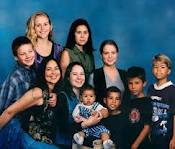 My family.
My family. My mom always dreamed of moving from Canada to the United States, becoming a huge star and hopefully, while she was at it, a teacher of wisdoms.This was her dream as far back as she can remember. But hopes of stardom and followers were never enough to make her take the leap and figure out how to live legally in a new country. What eventually brought us to America was my mother’s dream for her children.
Particularly, her autistic children.
The dream that they could live in a place where she was not the only person who would believe in them, where she was not the only person who would teach them while believing they could be taught, and where she was not the only person who would let go of the odd convenience or easy fix to help them become their best selves. America has always advertised itself as a place where dreams are pursued and limits are seen as challenges to be proven as frauds.
After traveling the continent for years in a red and silver van --all eight of us kids dubbed it the Disco Van-- never living in one place for more than two years, she finally discovered a home for our family. Believing in the saying ‘it takes a village to raise a child’ we were home with each other, and in the world so long as we were willing to be an example and leave when things weren't healthy anymore.
The home was us and the village was the world. A world that we traveled and enjoyed and tasted and learned from. We made stops, some long and some short, to connect with people and share stories, and then we moved on, to new places and possibilities.
Dr. Lynette Louise -my mom- is now a global autism expert, author, speaker, performer and host of the international reality series FIX IT IN FIVE with LYNETTE LOUISE aka THE BRAIN BROAD, airing on The Autism Channel. When offering her unique approach to mental health for families around the world (play therapy, family dynamics counseling, and neurofeedback) she meets many parents like herself; parents doing whatever it takes to give their challenged children the most positive and beneficial environment that they can. This is a beautiful and difficult thing. Parenting is never easy, it’s not supposed to be, and parenting children or adults who are unusually challenged while being treated as an inconvenience by far too many is that much harder.
Autistic children and adults have challenges that are difficult for others to understand or anticipate. Autism is a spectrum disorder with three main components: social challenges, repetitive behaviors, and a communication disorder. These symptoms manifest in so many different ways that true autism awareness is difficult to spread. One child may be completely nonverbal (like the oldest of my four autistic brothers) while another may speak clearly but with only a few very limited interests (like the youngest of my autistic brothers). Knowing one autistic individual doesn't educate you on others.
For my mother, the single mom of eight children (four of whom were autistic), with dreams of fortune, fame, and acceptance for her challenged and challenging family; it was the acceptance for us crazy kids that drove her. And, luckily for us, she paid the bills by singing and doing stand-up comedy. Laughter was a rule in our home!
Now, three of my four brothers are living independent lives. I have a brother who handles big machines while working on welding. He's been a pipeliner and owned his own home. I have a brother in the army. He's married and is about to be a dad. I have a brother who works as an assistant for a popular local barber, filling inventory and running errands. He lives a few blocks from me in a cute little apartment. I'll be seeing him today for coffee.
I have a brother who lives with my mom. He works as an uncle and friend to family, practicing speech and snuggling people when they could use a little love. He is often caught sneaking food.
My mom, who had dreams of stardom and wise lady on the mountaintop teachings travels the world spreading autism awareness and answers in a myriad of ways. As a performer, brain expert, speaker, author and hands-on therapist. Her bank account is most often empty, and not too many know her name, but she is surrounded by adoring fans: her clients, the struggling parents and professionals she has presented for, autistic people who are grateful for her ability to truly see them and, of course, her children.
Always and forever, we are her biggest fans!
It takes a village to raise a family. It truly does. But if you can't find a village that works for you don't give up! Create, encourage, teach, and learn. The village doesn't even have to know exactly what they are doing or how to do it. As long as you do!
Happy Holiday season, friends!!
I'm honored to play a role in your village!
Hugs, smiles, and love!!
Autism Answers with Tsara Shelton (Facebook)
______________________________________
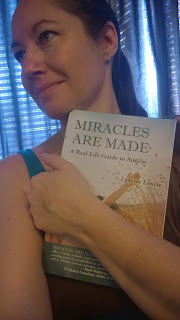
To learn more about growing up in my home I invite you to purchase my mom's book, MIRACLES ARE MADE: A Real Life Guide To Autism
Or my book, Spinning in Circles and Learning from Myself
for a feeling of what it was like growing up in my home and how I took those lessons to build a home for my own children.
Happy Thanksgiving!!
Published on November 22, 2017 12:51
November 16, 2017
Autism Answer: One Step Removed
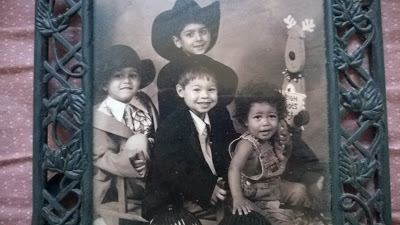 My boys
My boysAnother one of my sons is getting married.
My oldest son is going to have another baby.
My youngest son is finishing up his last year in high school, applying to colleges and deciding on the order of his future.
Another of my sons is focussed on finding work while actively being an amazing, babysitting, video making uncle.
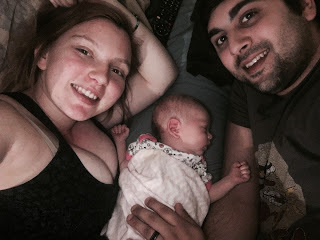 My oldest son with is wife and daughter
My oldest son with is wife and daughterMy husband and I are often snuggled in bed talking about and smiling about and reminiscing about these fabulous sons of ours.
Rarely, though, are we able to do things for them.
It feels strange, and new, and important, and discombobulating. Who are we now? My husband is retired. I'm thinking about stories. We're physically far away from most of our loved ones.
When the boys were younger they talked often with me about my role. We have always lived life right on the poverty line, sometimes on one side and sometimes on the other but always within view. I would ask them if they liked having me so available, or if they would rather I work, get a paycheck, buy them shoes. Always, without hesitation, they agreed that it was more like a rich life having me around than having new shoes. So, I was available. I was a "yes" mom. Can my friend come over? Yes! Can we go to the park? Yes! Want to watch this movie with me? Yes! Can you read a chapter of this book with me? Yes, yes, yes!
Although I could rarely say yes to requests for THINGS, I could almost always say yes to requests for ME, my time.
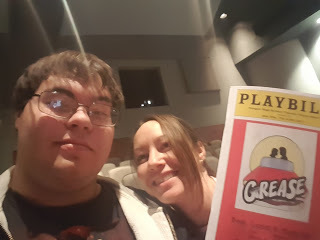 Me with my second youngest son at the theatreBut my sons are older, they are men. My baby boy is seventeen and my oldest son will be twenty-four in a month. A married man with a daughter and another child on the way. All of my sons are living their lives and creating their homes and setting up shop for their futures.
Me with my second youngest son at the theatreBut my sons are older, they are men. My baby boy is seventeen and my oldest son will be twenty-four in a month. A married man with a daughter and another child on the way. All of my sons are living their lives and creating their homes and setting up shop for their futures.I am still readily available to be a yes mom, but they don't really have requests for me anymore. Sure, they love me and have updates to share. They call me (EDIT: they answer or return my calls) with news and ideas to share, asking - always - that I share it all with their dad. (My husband is chronically uncomfortable with social calls or being on the spot.) They incorporate me and my husband in their lives and I doubt they even feel like our roles are much different from in their childhood.
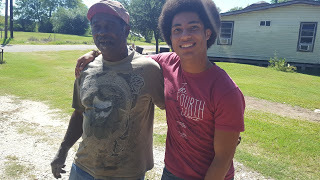 My youngest son and my husband
My youngest son and my husbandBut I feel it. I feel it big time!
This is not at all a sad thing. I'm beginning to truly, truly love being one step removed. I've worked hard and done a wonderful job of loving my sons. Sure, I made types of mistakes that I can barely understand, knowing how badly I wanted to be an amazing mom. But, still, I chose even more loving actions and words that I can be proud of. And, I am!
So my husband and I get to snuggle and know we are still a part of everything that happens next. We are more than part of it, we are a foundation things are being built on. And we, ourselves, exist on the foundation of our people.
I am still a yes mom and am learning what that looks like now that I'm one step removed. It's easier, more fun, and less frightening. Although, of course, it is also legitimately necessary and important.
My husband and I have earned this role of one step removed and are eager to take it on with pride and passion.
I love that!
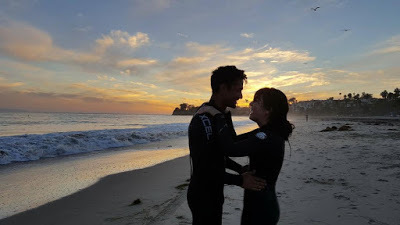 My second oldest son with his fiance
My second oldest son with his fiance Hugs, smiles, and love!!
Autism Answers with Tsara Shelton (Facebook)
Published on November 16, 2017 07:59
November 7, 2017
Short Story: To Be Needed (Fiction)
Author's Note: Quite a while ago Chuck Wendig posted a Flash Fiction Challenge called "The Fix." The prompt was “To fix something, you first must break it.” I was immediately inspired with an idea. But almost as immediately I cut my finger and was unable to write. Eventually my finger healed and I got busy with life. However, this morning I remember that idea and decided to write the story and hand it in late. I don't expect to get a good grade but I am excited to read all the stories that were posted in a timely manner. Feel free to join me! In the meantime, I hope you enjoy my short story. Although, it's quite sad. Sorry about that. ~Tsara_________________________________________________________
To Be Needed
It started innocently enough. A small pinch to make her cry. The odd shove as she got older, carefully timed and expertly hidden.
And then the pure joy of being the one to help. To hold and hug and fix the broken feeling for her daughter. Oh, how simply pure that feeling was! To be the reason, the only one who could make her sweet baby smile again!
In the beginning she needed no audience. The need to be the one who helps and heals was private enough, fulfilled by merely proving it to herself. But, soon, Essence needed to be known. Needed to be seen and applauded for her ability to sooth and settle her daughter.
However, as time went on the simple relationship between Essence and her daughter, Flow, refused to remain easy and clear. Flow was growing an unexpected personality. At only three years old she seemed to think that her mom was both her safe space and a danger zone. Essence had seen her try to get love and help from others; her grandma, her aunt, even the storyteller at the local library stepped in now and then when Essence wasn’t quick enough.
As Essence felt the necessity of herself slip away she amped up her game. This was for their own good, and she knew Flow would eventually understand even if it seemed to confuse and hurt her now. This was what it was to be a good mom. Putting yourself in the role of “bad guy” so that your child would learn important valuable lessons to keep herself safe and healthy in the future.
So pinches became hard core crushing squeezes while shoves became doors slammed on and into her, still carefully timed and expertly hidden. Essence at first tried not to enjoy the feel of her nails biting into Flow’s soft skin or the sudden rush of slamming a door into her daughter, but it didn’t make sense to not feel the joy of good parenting. So she allowed herself the adrenalin rush, knowing that soon she and Flow would be snuggled together, arms wrapped around each other, and the let down and release would be even that much better having been through the rush of adrenaline together.
It was a different version of the same feeling when there were people around to see her give such love and help to her daughter. Most of the time Essence would just wait for Flow to hurt herself naturally, a scraped knee on the playground or a push from that neighbor boy with the hippie parents who always seemed to be around but never appeared to offer rules or guidance. Essence doubted those parents ever hugged their son into feeling better.
Sometimes, though, Flow would play for hours without crying or getting hurt, without even seeming to want to be around her mom at all. Essence would feel her need to be the one who helps grow, gathering a hunger as it paradoxically filled her up. Looking around she’d see other parents helping their children and feel the prickly presence of judgement, knowing that she clearly wasn’t parenting or helping her daughter when her daughter was busy playing and not needing her. And without fail, if her daughter found another adult to talk to or smile at, Essence would move into action. The danger of allowing her daughter to seek friendship or nourishment from other adults or strangers was clear. Just one minute on a national news station would prove that point.
With practiced precision Essence would find a way to usher Flow into an accident and then she would swoop in lovingly, cooing and hugging and singing and positioning it all to be on display. The display wasn’t only for the high of feeling other eyes of approval on her, there was a strategic reason for it, too. When others saw her being wonderful to Flow, they would be sure to pass that on to Flow herself, if she ever tried to complain.
Yet, caught up as she was in her own game of fixing her daughter, she could also feel Flow’s reticence and confusion. It made Essence angry to think that others were seeing this and she would sometimes pinch flow in the midst of loving her. Then Flow would cry louder and Essence could coo and exclaim love with more passion and animation.
Some days Essence hated herself for this obvious manipulation. Some days she hated Flow for giving her the idea.
The day they had come home from the hospital, just Essence and Flow, alone in their tiny one bedroom apartment, Flow had cried every time Essence put her down. But the moment she picked her up and held her, the moment she sang or put Flow to her breast, Flow would relax into the comfort of safety and love. When Essence’s mom visited and held the baby, the baby would cry until given back to her. Essence had basked in that feeling. Had grown stronger and more confident as a woman. She was loved and she was needed.
As Flow got bigger and cried less, as she allowed others to hold and sing to her, Essence felt that confidence slip. The story she had built around their little family, that Essence and Flow were for and necessary to each other, began to crack. But when Flow would cry for real, when issues of pain or hunger hit, it was still only mom that gave her comfort.
So, with the knowledge that her job was to take care of and protect her daughter, Essence found ways to remind Flow that she was needed. Most often Flow didn’t know who was doling out the pinches and the doors were easily made to look like an accident.
But Flow was a clever three year old girl, and Essence was beginning to see that she had her work cut out for her. The clever girls were often the ones to try too soon for independence and put themselves in the most danger.
She might have to step up her game.# # #
Published on November 07, 2017 09:53
November 2, 2017
Autism Answer: Why Did I Say That?
Okay, we've all had those moments. Someone says something and we reply in a way we aren't too proud of. Or we find ourselves in a social situation without the right amount of coffee, maybe we're foggy headed or anxious, or both, and we do something we later (or immediately) regret. Some of us have this happen more often than others, but it happens to all of us.
We say something, or we don't say something, or we do something, and we spend the next (insert far longer time than we want to admit here) embarrassed or mad at ourselves. All the other things we KNOW we could have/should have done or said haughtily prance around in our brains! Overwhelming numbers of far more appropriate possibilities on display, only proving to ourselves that we KNOW better and should have DONE better!
We've all been there. We've all done this. We know it's relatable. Yet, when it happens, it still feels alone and yucky. Many of us still can't help but think: "Ya, but only I would do it that bad and say something that ridiculous in that type of situation this often."
Now, we all have our way of dealing with this sort of common "oops" moment.
When I was young, I just chose to use it as further proof that I am stupid and that I accidentally hurt or offend people with my stupid-ness and so I should just stay quiet. That was, ummmmm, unhelpful.
So now, I always remind myself to have fun imagining what people thought of me and my response. Rather than flog myself with imagining the horrible things they are thinking, rather than drown myself in only the possibility of me being stupid and accidentally cruel, I have fun. I'm kind to myself and to the other players involved.
For me, the best way to keep it fun and not turn it into an uncomfortable worrying about what they thought, is to remember that I actually have no idea. So I might as well make up all kinds of fun scenarios and possibilities! Also, people are mostly kind. Often they aren't bothering to think about how stupid I am because they are kinder than that. Also, they aren't really spending much time thinking about me anyway.
Once I have gotten the embarrassed feelings out of the way I have room to think about why I said what I said. There is always a why. Sure, I know better. Sure, I can do better. But in the moment I chose something even I don't like. Why?
Most of the time when I do this I simply see a challenge of mine that is still there. An issue I'm working on, no big deal really. We all have challenges. (Socially I am uncomfortable when I know my words and actions will reflect on a loved one, when I am volunteering at my son's school* or working for my sister or talking to a producer about my mom, etc., and often my nervousness about messing up will end up being the reason I do. It becomes a self-fulfilling prophecy.)
*In fact, this post was born out of my experiences volunteering to work the concession stand at last month's highschool football home game while I mentally prepare for my turn volunteering at tomorrow's home game. :D
But sometimes when I think about why I said or did the uncomfortable thing, I'll have a surprising epiphany about myself! An awkward moment where I say or do something I know was weird or unfair or inappropriate will reveal something about myself to me that I may not have known. These are magnificent moments, overflowing with potential for discovery! I exlore new ideas and become purposefully changed and more aware.
My best friend has anxiety issues and social encounters that go a little "wrong" can burrow in her brain and cause chaos in her thoughts for weeks. When she can't quite figure out how to stop perseverating over the issue she'll call me, knowing that I'm good for a laugh at least.
She knows how I solve that problem - by using my imagination much like she is, but by making the imaginings fun and kind - and she likes to tease me playfully for it. But she also appreciates it when I help by inventing stories for her. I know her well enough to make the stories fun and believable. But, at the end of the day, it's not that my trick works for her the way it works for me. In my friend's case, she's laughing and chatting about an issue with her best friend. A friend that doesn't attack anyone but prefers instead to invent kindness and good intentions all around. THAT'S what helps her.
I encourage you to have fun with your "Why did I say that?" moments, too! Perhaps inventing thoughtful stories in your head and then using the moment for self-discovery, as I do, will be fun for you. Perhaps calling a friend and talking it out is what will best work to keep you happy and confident.
Or do you have a fun tip you want to share with us? We have all been there! So there must be a neverending number of ways to healthily deal with this sort of "Oops!" moment. My favorite tips are the ones that step us into a kind, open minded, story-filled headspace.
And I know that's your favoirte type of tip, too.
Or maybe I imagined that....
tee hee!
Let's go out into the world and risk awkward social encounters so that we can imagine kind and fun possibliites about how they were recieved and understood!
Hugs, smiles, and love!!
Autism Answers with Tsara Shelton (Facebook)
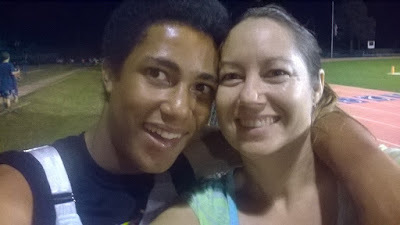 Me and my youngest son at a football home game.
Me and my youngest son at a football home game.
Published on November 02, 2017 13:51
October 24, 2017
Autism Answer: In Defense Of Sunny D
 Sitting in my fridge. Five huge plastic jugs of Sunny D sit in our refrigerator. Thinking about it, and even more seeing it, makes me want to cringe. Admittedly, I have cringed. I little bit.
Sitting in my fridge. Five huge plastic jugs of Sunny D sit in our refrigerator. Thinking about it, and even more seeing it, makes me want to cringe. Admittedly, I have cringed. I little bit.But, here's the thing. My husband loves to buy soda. Tons and tons of soda. He knows I don't like it. He knows it goes against many of the things that make me, me. He also knows that I never have said, and never will say, he can't have soda in the house.
When he brings it home (generally several two liter bottles, seemingly always on sale in larger quantities) he looks at me sheepishly, he apologizes timidly, and he puts the soda in the fridge. I remind him that I don't like it but that I love him and he likes it. I remind him why I don't like it and he hears some of what I say. He understands that I don't think it's healthy, he doesn't quite understand the stuff I add about plastic, giving money to corporations poisoning us for profit, etc.
What he fully understands is that I don't think he (or our children) should drink soda because it's unhealthy. That's one reason, and he's right.
So sometimes, like today, he comes into our home proudly touting items he believes I will applaud. He loves me, and he loves to show off the "healthy" snacks or drinks he's spent money on for us. He looks pleased as punch and smiles nearly-toothlessly at me with anticipation. He displays for me the item, today it was jugs of Sunny D, and eagerly awaits my praise.
"Oh, look, Sunny D," I say, forcing the smile and grabbing desperately for all the reasons I know I want to give him the reaction he's hoping for.
And there are reasons.
He loves me. He thinks of me while he's at the store. He puts down the soda (which he'd much rather spend the money on) and picks up something stamped words like "Vitamin C" and "Citrus Punch" and wants to do something healthy for my benefit. He is a beautiful man who puts family first and we are different but our moments add up to memories shared.
So, I clap my hands and say, "Yes! It's not soda! Awesome!"
And then a little later, after I find that I'm honestly happy and no longer have to push myself there, I thoughtfully add a few comments. "Now imagine if it was real juice, in a glass container, made from sustainably grown produce?! You'd have to pick me up off the floor after I fainted from surprised joy!"
And that's all. No more. I need to say my truth, and I need to love my life.
I will not drink the Sunny D but I will not choose to hate the sight of it in my refrigerator. How could I? It looks like love.
In relationships, this is a skill I consider worth working on. Seeing the actions done in the name of love without losing sight of expecting to be understood.
It's true that sometimes my husband (and my children) do things for me that actually just prove a lack of listening. But most of the time the love is showing and the action is about how much of the listening is understood.
I've experienced this even more so with my brothers. They are more challenged at understanding social cues and even straight up explanations (when my mom adopted them all four of my brothers had brain dysfunctions and learning disabilities) and so they struggle in various bigger ways to show their love and their listening with recognizable actions. It took me longer than I like to admit but once I was able to see how hard they were trying to both be heard and to listen, to be loved and to show love, my joy and comfort and ability to help grew a thousand fold!
So, I'll pour my husband a glass of Sunny D while I sip my coffee (yes, organic, fair trade, yadda, yadda) and I'll tap his foot with my foot as we sit on the floor, him watching his shows and me reading my book, and I'll feel loved.
I get to think about this right now, and share it with you, because of the emotions and thoughts that ran through me when I saw all those jugs of drink in my fridge.
So I'll admit it, this moment was a gift given to me by my husband with the help of Sunny D.
*Today's Autism Answer brought to you by Sunny D, though not sponsored by it.*
Hugs, smiles, and love!!
Autism Answers with Tsara Shelton (Facebook)
Published on October 24, 2017 07:43
October 19, 2017
Autism Answer: A Mother And Her Sons - A Tale Of Co-Sleeping
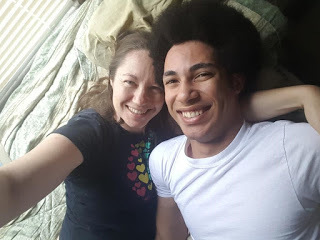 Snuggling my youngest son.A while back I saw this question online: Do Many Mothers Co-Sleep With Their Sons?
Snuggling my youngest son.A while back I saw this question online: Do Many Mothers Co-Sleep With Their Sons?As a mother of four sons who is a fan of co-sleeping I was happily compelled to answer. I thought it might be fun to share that answer here with you.
My Answer: Well, I don’t know about “many” but I’m happy to share about “me."
I have four sons and they all slept with me.
I had no worries about co-sleeping except this: How will I know when it's time to no longer allow it?
It turns out that while I wondered, they answered. As they got older they themselves pushed away and all I had to do was allow it. So there wasn’t a time when I found myself pushing them to sleep alone. Sure, I encouraged and guided and nudged, but it wasn't much of a challenge. As they got older, they wanted it.
However, with all four of my sons this age came at a different time.
Now, my situation was certainly unique in that I was a single mother of three, and then a married mother of four, but my husband and I lived in two separate (but close) homes. So sleeping arrangements could easily and organically follow this rhythm.
We didn’t snuggle in the same bed every night - though some of my sons did more than others - and sometimes I slept with them in their beds. Also, we travel a lot and when sleeping together in cars, hotels, people’s homes, it was easy for us because we were already comfortable with sharing space.
My sons are mostly adults now - ranging in age from 17 to 23 - and they are healthy sleepers.
Admittedly, my 21 year old son complained to me the other day about one thing that might have been caused by all of this co-sleeping and snuggling. “You’ve turned me into a cuddle addict. It’s driving me and my girlfriend crazy! It’s like I’m begging her for a cuddle-hit all the time.” And though we laughed, it is actually true. He loves physical contact. However, he is also an easy sleeper with a lovely life and a healthy confidence. So, maybe it also gave him some of that. :D
The truth is, my four sons are all healthy young men who sleep well and are largely emotionally confident - though they are all definitely drastically different from each other! I don’t think any of that is because of the co-sleeping but I do honestly believe much of that is because of the reason for our co-sleeping. We did it because we were comfortable, happy, and followed our instincts more than our desire to be seen as “normal” or “right."
Oh, I should add this - in terms of ages, they were older than you might expect when they stopped snuggling me for sleep. They were all different ages but it was between eight and twelve. The son who was twelve is also the son who is the most quirky and unique. “A little bit autistic,” he calls himself.
And, indeed, my two youngest sons (one of whom is the gentleman referring to himself as, "A little bit autistic") do have symptoms of autism, though they've never been diagnosed. One of my younger sons doesn't sleep at night. Sleeping at night has never been natural for him but in his younger years, as a student of public school, he had no other choice. Having me snuggle and sing and chat and tell stories helped him find a way to get some sleep. And my very youngest son found comfort and good dreams with the sensory delight he discovered in playing his fingers through my hair. So we would snuggle, I would sing, he would wrap his hungry fingers through my hair, slowly getting less and less needy, first as the evening went on and then, over the course of years, as days and weeks went on. Eventually, he no longer felt compelled to play with my hair in order to destress and find comfort. Though he still sometimes touches it out of curiosity and nostalgia. I like it!
I am absolutely certain that if I was living with my husband for those years our sleeping arrangements would have been different. But even my hudnsnf is willing to follow what works in our family more than traditional norms. In fact, we live together now (with only two of our sons) and our bed is in the living-room. That way the boys have their own room and we are in the center of our small house where we can feel among everyone without being annoyingly close.
So, ya. That’s how we did it. I think it’s important for moms and dads to allow their children to push them away if they do choose to co-sleep, and I think it’s important not to do it at all if it feels overly uncomfortable or just wrong.
I think parenting is a lot about following instincts and working together with a willingness to be different and allowing the environment to play a role.
So, I was a mom who had sleepovers with her sons. And sometimes, I miss it!
Hugs, smiles, and love!!Autism Answers with Tsara Shelton (Facebook)
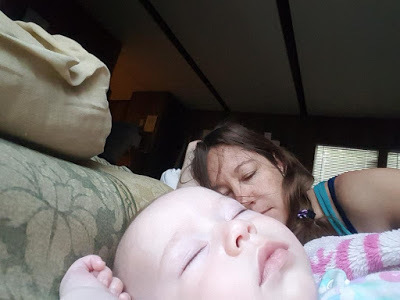 Snuggling and co-sleeping with my granddaughter. It's tradition!
Snuggling and co-sleeping with my granddaughter. It's tradition!
Published on October 19, 2017 08:49
October 15, 2017
Autism Answer: No Means No - And Even More, You Need Permission
 Me, thinking.
Me, thinking. "What did I do? How did I screw up again? What is it about me? Why am I so weak and pathetic?"
Those are the things I wondered every time I was sexually harassed, molested, or raped.
"Well, it was only boob touching, it was only rubbing my bum, it wasn't me screaming and fighting and getting punched and stuff."
Those are the things I said when loved ones encouraged me to tell, to bring the incidents to the attention of authorities.
"No means no. Even if you think it's a game, even if nobody is screaming, no means no. Every time. Not only that, you need to get permission. You need to be told yes. Every time."
That was the thing a judge said when I did go to court, when I did listen to my sister and my mom and go to authorities.
It was a huge, huge, huge important thing. Because, you see, I hadn't known. My rapist hadn't known. We were equally surprised to learn it. I had felt certain that my promises of sexual interest the weeks before gave me next to no rights that day he showed up with a friend. I believed my tears and quiet pleas of, "no, I changed my mind," were, as my rapist said, unfair and invalid.
I had heard, of course, that no means no. I had heard it before that day. But I hadn't believed it. Not until that judge said it with such clarity from his important place in that room. I listen, we all listen, to authority and power in a different way than we listen outside of it.
When authority and power takes advantage, sexually and otherwise, we hear it different. We believe it different.We expect different things from ourselves and the people around us.
By that same token, though, when authority and power chooses to teach, example, and insist on equality, on kindness, on speaking up, we hear it different. We believe it different. We expect different things from ourselves and the people around us.
I would like to say that when I left that court room I never blamed myself again. I'd like even more to say that I never had reason to wonder who's fault harassment and sexual abuse were. I can't say that. It still happened. In this world, where the culture is one that breeds a belief in "boys will be boys" and "what a cock tease" and "way to go man, high five" and "well, you shouldn't have been alone with him" it's more likely to happen than not, I fear. I can tell you, however, that I knew now that no means no. I knew that people had no right to touch my boobs or my bum without me telling them yes. And I knew I had no right to do such things to others without their permission. I can tell you that I started expecting different things from the world, and I started walking away and telling authorities when things were inappropriate. I had learned that sometimes people just don't know that what they are doing is wrong, and when they do know I have a right and responsibity to speak up so it might not happen to others. "What did I do? How did I screw up again? What is it about me? Why am I so weak and pathetic?" This is one reason people don't tell when they are abused or harassed.But there are many others. Losing our jobs, thinking it's normal, knowing that other stronger women have been through more and handled it, these are a few other reasons. And there are more. Some people don't tell because they don't have the ability to. In the world of disability sexual abuse and harassment is a big problem. Also, pedophilia is a big problem. Disabled people and children are already too often taught by society that they ought to shut up and do what they are told. Often they are treated as less than or as lucky to be taken care of in the first place. Often, they just don't have the ability to speak at all because of their disabilty or young, young, young age. I wish I could gather everyone into that courtroom with me, everyone in the world, and we could listen together in the same way I listened that day. I wish everyone could hear, the way I heard - with conviction and belief and life changing tectonic plate shifting clarity - what I heard that judge say.
"No means no. Even if you think it's a game, even if nobody is screaming, no means no. Every time. Not only that, you need to get permission. You need to be told yes. Every time." If you ever catch yourself, as the done-to or the doer, justifying by thinking these sorts of things: "Well, it was only boob touching, it was only bum rubbing, it wasn't screaming and fighting and getting punched and stuff." And there was not permission given, no clear "yes" offered, then something went wrong. (And where disabled people are concerned "yes" can be not enough, depending on the disability, and where children are concerned, just NO.) Don't hate yourself. But take steps to change it. Reach out and appologize or admit your cruelty if you were the doer, talk to the safest person for you, in your situation, if you are the done-to. Sex and sexuality are interesting and exciting and filled with valuable fun, love, learning, and exploration. I encourage you to do the work of making sure it is done carefully and mindfully. We have to change the culture around this issue. We have to be not afraid to ask for sex while we aren't afraid to say no. We have to teach each other that it is never ever okay to push or force or sneak in unwelcome touches. No means no. And even more, you need permission. It's simple, really. Let's make sure everyone gets the memo. Let's change the culture.
We've got to.
Hugs, smiles, and love!!Autism Answers with Tsara Shelton (Facebook) __________________________________________________________
Published on October 15, 2017 14:38



